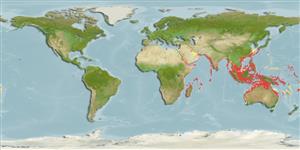>
Eupercaria/misc (Various families in series Eupercaria) >
Lutjanidae (Snappers) > Lutjaninae
Etymology: Lutjanus: Malay, ikan lutjan, name of a fish.
Eponymy: Dr Patrick Russell (1727–1805) was a British surgeon and naturalist. [...] (Ref. 128868), visit book page.
More on author: Bleeker.
Environment: milieu / climate zone / пределы глубины / distribution range
экология
морской; солоноватоводный ассоциированный с рифами; пределы глубины 3 - 80 m (Ref. 9710), usually 20 - 50 m (Ref. 48635). Tropical; 31°N - 38°S, 31°E - 178°W (Ref. 55)
Western Pacific: Indian Ocean distribution provisionally included as records of L. indicus; species needs to be reassessed, preferably utilising genetic analysis.
Length at first maturity / Size / Вес / Возраст
половая зрелость: Lm ?, range 29 - ? cm
Max length : 50.0 cm TL самец/пол неопределен; (Ref. 469); common length : 30.0 cm TL самец/пол неопределен; (Ref. 55)
колючие лучи спинного плавника (общее число) : 10; членистые (мягкие) лучи спинного плавника (общее число) : 14; колючие лучи анального плавника: 3; членистые (мягкие) лучи анального плавника: 8. This species is distinguished by the following characters: body moderately deep to somewhat slender, greatest body depth 2.6-2.8 in SL; preopercular notch and knob poorly developed; vomerine tooth patch triangular or diamond-shaped, with a medial posterior extension; tongue with a patch of granular teeth; gill rakers of first gill arch 6-7 + 7-11 = 13-18 (including rudiments); caudal fin truncate or slightly emarginate; scale rows on back rising obliquely above lateral line. Colour generally pink to whitish with a silvery sheen; a black spot, mainly above lateral line, below anterior rays of soft dorsal fin (adults from the Indian Ocean usually with 7-8 narrow golden brown stripes on sides); juveniles whitish with black stripes on sides and most Indo-Pacific fish with a pale-edged round black spot on upper back (Ref 9821, 90102).
Body shape (shape guide): fusiform / normal; Cross section: oval.
Adults inhabit offshore coral reefs and also inshore rocky and coral reefs (Ref. 30573), at moderate depths, usually over 20 m, and is more common in about 50 m depth (Ref. 48635). Juveniles frequent mangrove estuaries and lower reaches of freshwater streams (Ref. 30573, 48635). They feed on benthic invertebrates and fish (Ref. 5213). Sold in Hong Kong live fish markets (Ref. 27253). A common market fish throughout its range; also a component of artisanal fisheries. Caught with handlines, traps, and bottom trawls and marketed mostly fresh (Ref. 9821).
Allen, G.R., 1985. FAO Species Catalogue. Vol. 6. Snappers of the world. An annotated and illustrated catalogue of lutjanid species known to date. FAO Fish. Synop. 125(6):208 p. Rome: FAO. (Ref. 55)
Статус Красного Списка МСОП (Ref. 130435: Version 2025-1)
Угроза для людей
Harmless
Использование человеком
рыболовство: коммерческий; аквакультура (рыбоводство): коммерческий; объект спортивного рыболовства: да
дополнительная информация
инструменты
Специальные отчеты
Скачать в формате XML
ресурсы в Интернет
Estimates based on models
Preferred temperature (ссылка
123201): 24.4 - 29.1, mean 28 °C (based on 1448 cells).
Phylogenetic diversity index (ссылка
82804): PD
50 = 0.5000 [Uniqueness, from 0.5 = low to 2.0 = high].
Bayesian length-weight: a=0.01318 (0.00848 - 0.02050), b=2.98 (2.86 - 3.10), in cm total length, based on LWR estimates for this species & Genus-body shape (Ref.
93245).
Trophic level (ссылка
69278): 4.1 ±0.4 se; based on diet studies.
устойчивость к внешним воздействиям (ссылка
120179): средний (среднего размера), минимальное время удвоения популяции 1.4-4.4 года (Assuming tm<5).
Fishing Vulnerability (Ref.
59153): Moderate vulnerability (40 of 100).
🛈
Nutrients (Ref.
124155): Calcium = 32.3 [20.1, 49.8] mg/100g; Iron = 0.348 [0.224, 0.578] mg/100g; Protein = 18.7 [17.2, 19.9] %; Omega3 = 0.146 [0.100, 0.217] g/100g; Selenium = 57.8 [34.0, 93.4] μg/100g; VitaminA = 209 [39, 856] μg/100g; Zinc = 0.46 [0.35, 0.64] mg/100g (wet weight);
